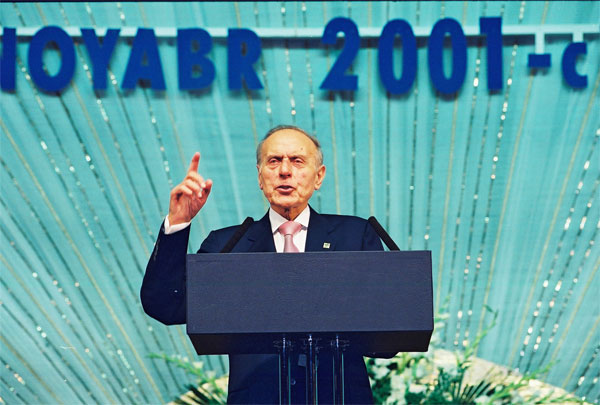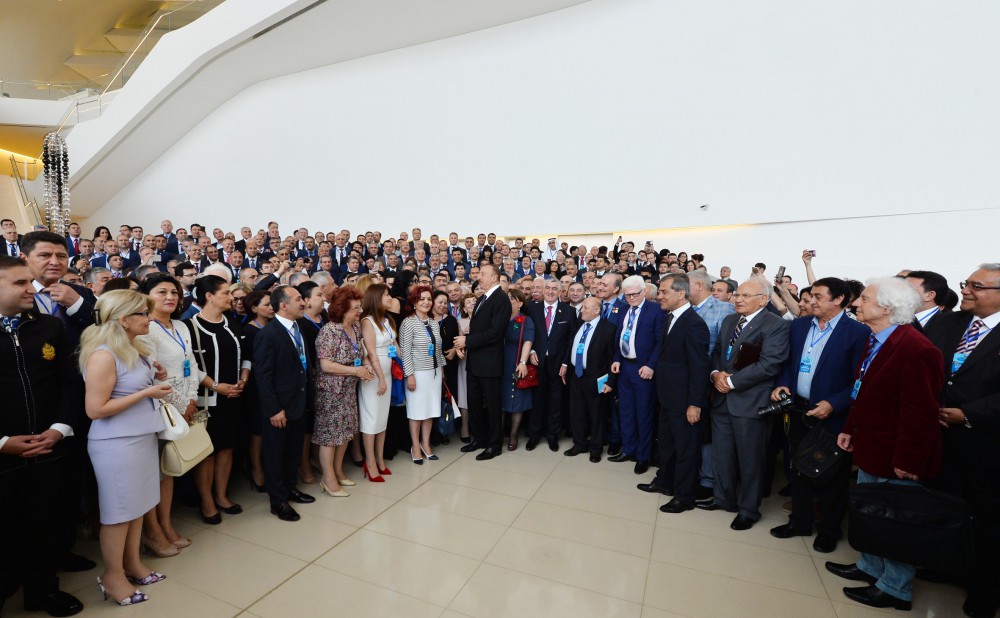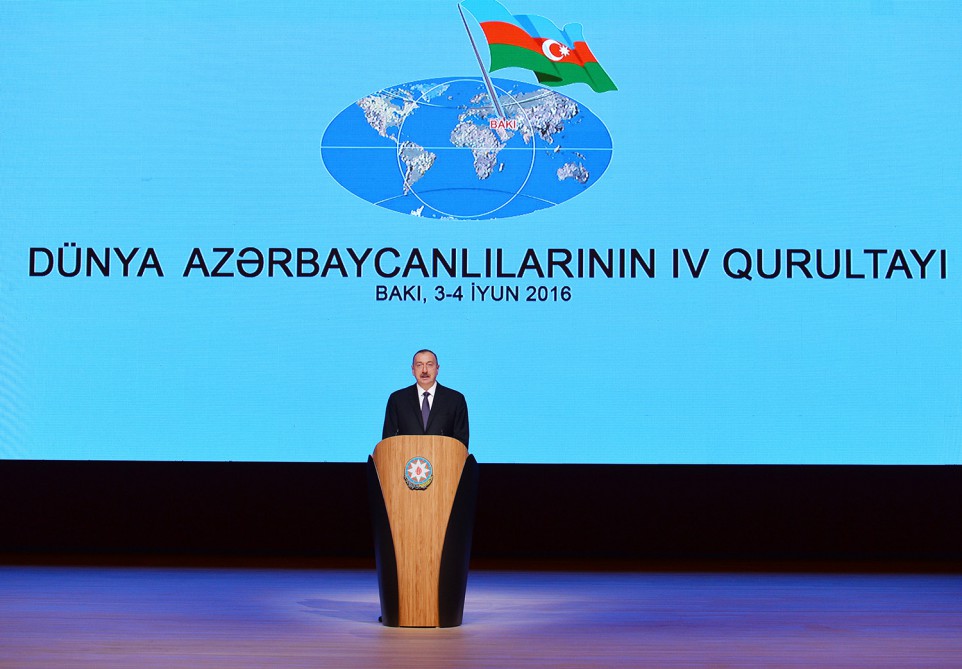GENERAL INFORMATION

"Diaspora" is an old Greek word that is translated as "sparseness". The appearance of the word dates to the period of occupations and migration started by the Greeks long ago A.D. During hostilities to different countries, a part of the Greek army settled in the occupied territories and turned to permanent settlers of that place. The term "Diaspora" came from their tongue.
Despite the sphere of activity, engagement and religious settlement of people of any ethnos aside from their historical lands for some period of time and their social activity cause the formation of the Diaspora.
Though Azerbaijan has recently acquainted with this term, the settlement of our compatriots in different countries of the world started several centuries ago. In comparison with other people, to leave the country was especially hard for Azerbaijanis for the reason that they were bound to their motherland. One may notice the theme of 'Motherland and abroad' to be one of the most popular themes in Azerbaijan folk literature. This fact proves quite the old age of the establishment of the Azerbaijan Diaspora.
The term 'Azerbaijan Diaspora' today means Azerbaijanis settled in foreign countries. The definition of the notion "Azerbaijanis living in foreign countries" is given in the Law of the Republic of Azerbaijan "About the state policy on the Azerbaijanis living in foreign countries". It says that "Azerbaijanis living in foreign countries" are the citizens of the Republic of Azerbaijan and their children living abroad the Republic of Azerbaijan, a former citizen of Azerbaijan SSR or the Republic of Azerbaijan living abroad the republic of Azerbaijan and their children, and individuals relating themselves to Azerbaijan on ethnic, language, cultural or historical ground.
The migration of Azerbaijanis to foreign countries was more intensive in the early 20th century. Anti-Moslem and anti-Turk policy of tsarist Russia aimed at weakening the dominant position of Azerbaijanis in the Caucasus. The genocide was carried out by Armenians during 1905-1906 and in 1918 and the policy of ethnical cleaning had the same strategic purpose.
After the establishment of the Democratic Republic of Azerbaijan in 1918, the migration to foreign countries lessened enough. The destruction of the Democratic Republic formed a new situation. Serious pressures and persecutions of founders and supporters of the Democratic Republic by the Bolsheviks made them eave the country. This period is characterized by the mass migration of Azerbaijanis to foreign countries.
The first attempt towards the organisation of the Azerbaijan Diaspora was the establishment of the "Azerbaijan Culture Circle" in Ankara, Turkey on February 1, 1949. Saleh bey Sheykhzamanli, the son of Nagi bey Sheykhzamanli, the Minister of National Security in the period of the Democratic Republic of Azerbaijan, established in 1956 'Azerbaijan society of America' in the USA. Today the mentioned society is ruled by the grandson of Saleh bey Sheykhzamanli Tomris Azeri. Thus we may come to the conclusion that the period of establishment of Azerbaijan Diaspora started in the middle of the past century. We don't have any other fact evidencing the establishment of the communities and unions relating to Azerbaijanis till that time.

After World War II starts a new period in the history of the Azerbaijan Diaspora. Greatly increased the number of our compatriots living in foreign countries during the war and in the peace. Those were Azerbaijanis taken hostages in the war and those for different reasons left for Europe after the war. Cruel and merciless punishment mechanisms and bloody repressions of the Soviet regime prevented their return. Thus the quantity of Azerbaijanis living in foreign countries increased.
The number of applications during recent decades from Iran-the settlement of about 30 million Azerbaijanis- prevail those migrating abroad.
Several years after World War II hard borderline regime applied by the Soviet government prevented general flow abroad the USSR. But the dissident movement was more mass in the character in comparison with the previous one. The same danger was not an exclusion for Soviet Azerbaijan. In 1969 — the period of extension of the dissident movement and free thought in the USSR-Heydar Aliyev took his place at the head of Azerbaijan. He founded a new stage in the life, social consciousness and formation of national self-consciousness of the republic.
Beginning in the early 70s of the 20th-century national revival, the development of the economy, culture, science and education, perfection of moral values stimulated national self-consciousness. In 70-80s Heydar Aliyev did his best to preserve the historical memory of the people, development of culture and popularisation of Azerbaijan in the world.
The evident and systematic engagement in the problem of Diaspora on ideological base was impossible at that period for its political realities. Nevertheless, serious attempts made to develop culture, art and science, the achievements of our Republic widely popularised and used each opportunity that would serve the relation of the world Azerbaijanis with Azerbaijan. Intensification of cultural relations in foreign countries, development of translation, the establishment of the Azerbaijan Cultural Relations Society with the help of the Azerbaijanis living abroad (the society "Veten" (Motherland)) served the unification of compatriots and their relations with the Motherland. The thorough development of our country awoke the feeling of national pride and increased the interest and bond of Azerbaijanis to their motherland.
National leader Heydar Aliyev paid particular attention to the intensification of scientific-intellectual potentiality. Thanks to his attention hundreds of Azerbaijanis got the opportunity to get their education in progressive educational institutions of the USSR during his ruling. More than 15000 Azerbaijanis got their education on more than 250 specialities in science, economy, culture, industry and other necessary spheres in more than 170 institutions of higher education in more than 50 great cities of the former USSR. The majority of the professional community returned to Azerbaijan and served the development of Azerbaijan. The other part settled in the cities they got their education. Thus integration processes in the soviet state in 70-80s and education in other countries stimulated their migration. They started their activity abroad and thus helped the unification of our compatriots and the development of our science and culture. Particular importance in the intensification of the national consciousness of world Azerbaijanis played the activity of Heydar Aliyev in Moscow as one of the leaders of the Soviet state. The worldwide political activity of the national leader is evaluated by our compatriots as the reflection of national consciousness and character and thus intensified self-assurance, self-consciousness and unity of our people.
Historical progress of Azerbaijan people caused in re-establishment of irrevocable state independence in the late 20th century. But the social-political processes made Azerbaijanis leave their historical lands and settle in different countries of the planet.
The event in the USSR in the late 80s of the past century stimulated extension of the democratic way of thinking and inflammation of national movement for freedom. The process was more intensive. For this reason, Azerbaijanis were named 'the most militant people of the world' in 1989. A particular role in national awakening and intensification of self-consciousness played diversions by Armenians in the inseparable part of Azerbaijan Nagorny Karabakh.
The events of the 20th of January of 1990 remained in history as the great occurrence approving the national integrity of Azerbaijan people. The tragedy united the Azerbaijani people and revealed the power of world Azerbaijanis. Heydar Aliyev made a speech in Moscow on the January 20th tragedy and expressed the political will of his people. His feelings of citizen honour and real patriotism stimulated his courageous speech that raised Azerbaijanis. The declaration stimulated the organisation of the world Azerbaijanis in a whole nation. It gathered all our compatriots around the only statesman and national leader capable to assume responsibility for his people.
There is a great need to find out the more favourable solution to the problems and difficulties that appeared in the process of formation under the national Diaspora of the Azerbaijanis living in foreign countries and in creating relations with our Republic.  About 300 communities and organisations function in the majority of world countries today. The process of the formation of the Diaspora is still on today.
About 300 communities and organisations function in the majority of world countries today. The process of the formation of the Diaspora is still on today.
Common purpose united many societies and associations functioning separately and established federal Azerbaijan associations, such as All-Russia Azerbaijan Congress, the Congress of Ukraine Azerbaijanis, Federal National-Cultural Autonomy of Russia Azerbaijanis, Germanic Federation of Azerbaijan Societies, Sweden-Azerbaijan Federation, 'Turan' congress of Azerbaijanis from Kazakhstan, Kyrgyzstan, and Uzbekistan and Social Association "Azeri" in Kyrgyzstan. Those societies and associations could carry out important works for the development of the relations between Azerbaijan and the countries they function in, organisation of our compatriots and intensification of the relations with their Motherland. With the purpose to increase the power of the Azerbaijan Diaspora, the State Committee on the Affairs with Diaspora controls the establishment of new societies and associations. Thus the tendency o the establishment of new societies and associations spread to another country and caused the formation of the Congress of Azerbaijan Communities of Byelorussia, the Congress of Azerbaijanis from Moldova, the Association of Azerbaijan Centres of Culture in Uzbekistan, Azerbaijan-Norway Association. The abovementioned federal associations take all the necessary and possible measures to organise Azerbaijan Diaspora and to intensify their activity, they try to successfully carry out the responsibilities they assumed.
As a result of these efforts, today, more than 460 Azerbaijani communities have been established in Europe, North and South America, the CIS and many countries, including Uzbekistan, Kyrgyzstan, Norway, Netherlands, Germany, Spain, Italy, Belgium, Bulgaria, Czech Republic, Finland, Estonia, Poland, United Arab Emirates. Egypt, Turkey and the United States. The establishment of new Azerbaijani communities and communities deserves recognition as the successes of modern Azerbaijani diaspora construction.



